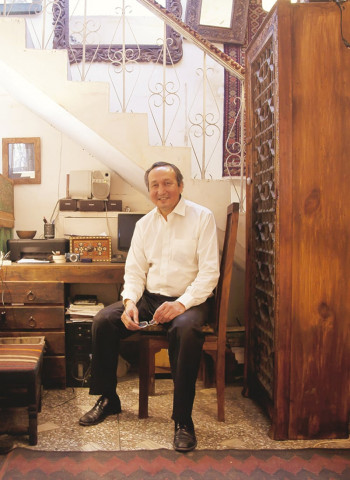Carpentry: A gateway to history
Abdul Ghafoor Khudaybirdi is preserving Pakistan’s history of carpentry one piece at a time

Each piece of wood in the showroom, with its distinct tone, texture and grain, has a story to tell and Abdul Ghafoor Khudaybirdi is the man who brings these tales to life. Born to a farmer in the early ’60s in Afghan Turkestan, Khudaybirdi was one of seven children. He would often accompany his father, who herded horses, camels and sheep, on trips across the border to Peshawar, Pakistan. When war broke out in Afghanistan, Khudaybirdi was sent to Turkey to complete his education. At the age of 18, he moved to London to study business for three months where he found a partner and began importing carpets from Turkey and Pakistan, frequently visiting both regions to ensure quality control. When Khudaybirdi decided to relocate with his parents to Islamabad, his commitment to preserve heritage, especially the craft of carpentry, took the form of multiple carpentry workshops and a showroom.

Inside one of Khudaybirdi’s workshops in Islamabad which is stacked with unique pieces of old furniture. PHOTOS : SA’ADIA KHAN
The quality and beauty of Khudaybirdi’s furniture is testament to a region steeped in history. “All the ironwork we use in our pieces are original, they have not been manufactured by us. We acquire all our material from houses that are being demolished in rural areas of Punjab and Khyber-Pakhtunkhwa,” says Khudaybirdi. He also rescues pieces that have been carelessly scrapped — including a chair made from 100-year-old wood — and restores them to their original form. “People are moving towards modernity and they do not value these pieces for their historical value. But we do.” He recalls an instance when he was requested to appraise the original woodwork, including windows, doors and door frames, of a mansion located in Gujrat by the proprietor who intended to demolish the house. Khudaybirdi requested him to preserve the building as a part of the area’s heritage and eventually walked away courteously.

Khudaybirdi’s trains craftsmen to follow the traditional method of woodcarving in order to preserve it. PHOTOS : SA’ADIA KHAN
“None of these pieces can be made again,” Khudaybirdi states after pausing to glance at the numerous beautiful items crammed into his office. “No one has the craft or craftsmanship [to do this anymore]. We train painters and [woodcarvers], but it [is not] the same [despite] following the same procedure,” he explains, using the example of Kashmiri pashmina, embroidery and hand woven carpets. “In Central Asia and Turkey, people are more inclined towards synthetic materials now, but we can try,” he says, adding that craftsmanship is a legacy that should be passed on from one generation to the next.

The process of recreating and restoring is long and arduous as some pieces are big, up to six feet by four feet in dimension. Khudaybirdi has four workshops in Islamabad, two in Peshawar and one in Chiniot. When asked if he would consider moving his showroom to larger premises, he replies quite adamantly, “No, this is my only showroom. I will keep this until I am in Pakistan.” His ultimate dream, however, is to establish a museum or cultural centre to preserve and showcase some of the doors and original pieces of antique furniture that he has reclaimed and revived.

Inside Khudaybirdi’s only furniture shorwoom in Islamabad that is replete with wooden treasures. PHOTOS : SA’ADIA KHAN
“The future of this furniture is limited. Pakistan has little to no tourist industry and the middle class is very small. I think 20 years from now, it will be a rarity to acquire any such items from the rural and tribal areas,” Khudaybirdi fears. While deforestation, urbanisation and industrialisation are major worldwide concerns, Pakistan’s forest resources, in particular, are shrinking rapidly. Any form of revival and restoration, therefore, must be done now and fast. With Khudaybirdi not planning to retire for the next 15 years, there will always be a home for these abandoned pieces of priceless craftsmanship.

Sa’adia Khan is a freelance photographer based in Islamabad. She tweets @IM_SaadiaKhan
Published in The Express Tribune, Sunday Magazine, November 16th, 2014.



















COMMENTS
Comments are moderated and generally will be posted if they are on-topic and not abusive.
For more information, please see our Comments FAQ